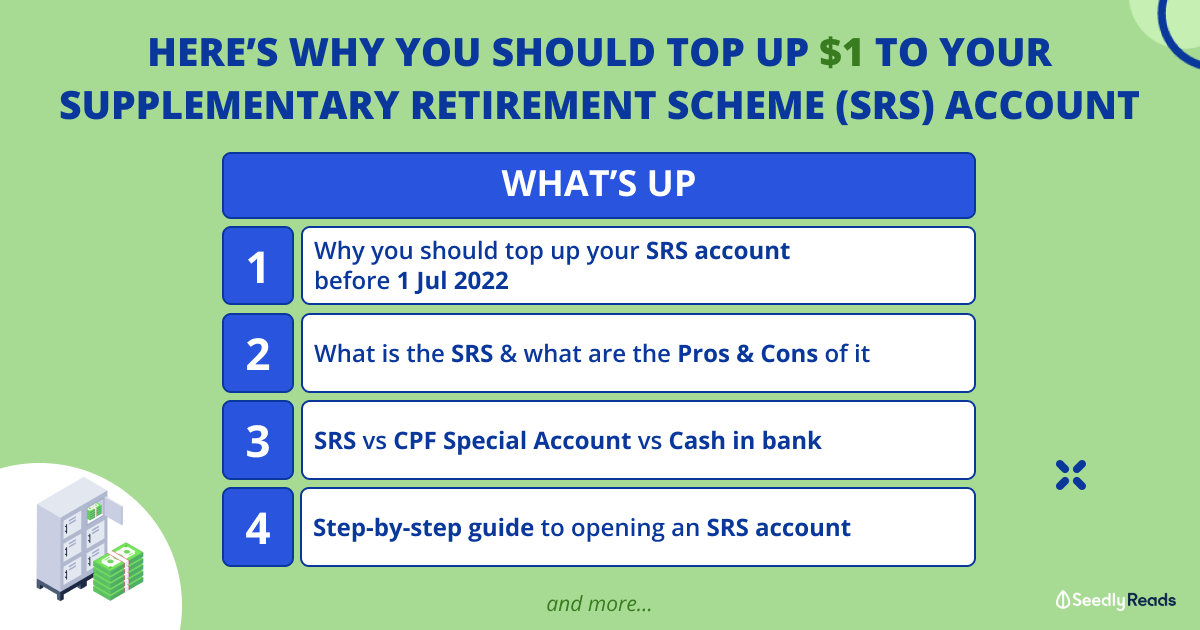Advertisement
Is it a good idea to open an SRS account and contribute annually just for the sake of tax relief purposes?
What would be the pros and cons?
7
Discussion (7)
Learn how to style your text
Elijah Lee
27 Nov 2019
Senior Financial Services Manager at Phillip Securities (Jurong East)
Reply
Save
I put down my viewpoint in a couple of similar questions, and here's to helping you answer the question given lack of information (age, current assets, martial status etc)
1) I don't think it makes sense for women who are very close to having children soon. Reason being once you have about two children, the woman would be claiming near max of 80k tax relief, mainly from cpf relief and the working mother child relief. Doing the srs in that situation gives no further relief.
2) you need to evaluate the cost benefit. Here's a quick way, on your latest tax assessment for 2018, look for your incremental tax rate (the % that applies to On the next ...k). You multiply that to the planned srs contribution and that should approximate the relief you get (assuming you are not maxed out on reliefs).
Example if your incremental tax rate is 8.5%, for an srs contribution of 10k, then the tax savings to be enjoyed next year is about $850. Think of it this way, you are giving up 10k for a very long time to get a one-time tax benefit of 850 (in the example). Is it worth it to you?
Of course, 850 wont be all the benefit, but it depends on what you do with the money. Putting it to buy SSB of about 2% is like the safest option, but you wont be getting a lot of mileage... After 20 years, the 10k of SSB may mature only to about 15-16k. On the other hand, if you invest well, and get an average return of say 6%, you might have turned the 10k to about about 33++k at end of 20 years, while getting the benefit of 850 tax savings.
I would say
if your incremental tax rate is less than 7.5%, you are very likely better off keeping the cash and forgo the relief. You will most likely find a better use for the entire sum in ready cash.
if you are on the way to having children, just go for the cpf retirement sum top up until you reached frs.
if you are still new to investing, go for cpf retirement sum top up and go for risk free 4% first. Not many products can simply outperform risk free 4% with no transaction fee.
if your tax bracket is still very high, you are still eligible for that amount of tax relief, and you will definitely find a use of that money for some form of annuity or investment, then yes go for SRS.
Reply
Save
Just put $1 in your SRS first to lock-in your withdrawal age of 62 years old.
Read up on other tax a...
Read 4 other comments with a Seedly account
You will also enjoy exclusive benefits and get access to members only features.
Sign up or login with an email here
Write your thoughts
Related Articles
Related Posts
Related Posts
Advertisement









Hi Melissa,
SRS as a scheme was conceived to encourage Singaporeans to save more for retirement. To attract people to contribute, tax relief on SRS contributions was introduced.
It is a good idea to open and lock in your withdrawal age. However, whether or not to contribute annually will really depend on the tax savings you can derive from it.
The key things you need to take note, along with some pros and cons are:
If you were going to invest for retirement at any rate, and can refrain from touching your assets till then, then SRS is a good way to save tax and prepare for retirement at the same time.